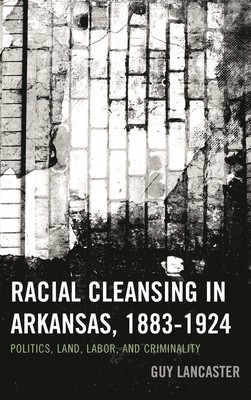
- We will send in 10–14 business days.
- Author: Guy Lancaster
- Publisher: Lexington Books
- ISBN-10: 0739195492
- ISBN-13: 9780739195499
- Format: 15 x 22.6 x 1.5 cm, minkšti viršeliai
- Language: English
- SAVE -10% with code: EXTRA
Reviews
Description
Even before the end of Reconstruction in Arkansas, the state already possessed a long-standing reputation for violence, including lynchings, duels, and feuds. However, the years following Reconstruction witnessed the creation of new forms of mob violence. All across the state, gangs of whites sought to drive African Americans from their homes, their jobs, and their positions of authority, creating communities shamelessly advertised as "100% white." This happened not only in the highland regions, the Ozarks and the Ouachitas, where the expulsion of African Americans created so-called "sundown towns," but it also occurred in the low-lying Delta lands of eastern Arkansas, where cotton was king and where masked mobs of landless "whitecappers" and "nightriders" regularly dealt terror and murder to black sharecroppers. Racial Cleansing in Arkansas, 1883-1924: Politics, Land, Labor, and Criminality by Guy Lancaster is the first book to examine the phenomenon of racial cleansing within the context of one particular state, illustrating how violence relates to geography and economic development. Lancaster analyzes the wholesale expulsion of African Americans and the emergence of "sundown towns" together with a survey of more limited deportations, including those with blatant political goals as well as vigilante violence. The book has broader implications not only for the study of Southern and American history but also for a deeper understanding of ethnic and racial conflict, local politics, and labor history
EXTRA 10 % discount with code: EXTRA
The promotion ends in 21d.18:30:01
The discount code is valid when purchasing from 10 €. Discounts do not stack.
- Author: Guy Lancaster
- Publisher: Lexington Books
- ISBN-10: 0739195492
- ISBN-13: 9780739195499
- Format: 15 x 22.6 x 1.5 cm, minkšti viršeliai
- Language: English English
Even before the end of Reconstruction in Arkansas, the state already possessed a long-standing reputation for violence, including lynchings, duels, and feuds. However, the years following Reconstruction witnessed the creation of new forms of mob violence. All across the state, gangs of whites sought to drive African Americans from their homes, their jobs, and their positions of authority, creating communities shamelessly advertised as "100% white." This happened not only in the highland regions, the Ozarks and the Ouachitas, where the expulsion of African Americans created so-called "sundown towns," but it also occurred in the low-lying Delta lands of eastern Arkansas, where cotton was king and where masked mobs of landless "whitecappers" and "nightriders" regularly dealt terror and murder to black sharecroppers. Racial Cleansing in Arkansas, 1883-1924: Politics, Land, Labor, and Criminality by Guy Lancaster is the first book to examine the phenomenon of racial cleansing within the context of one particular state, illustrating how violence relates to geography and economic development. Lancaster analyzes the wholesale expulsion of African Americans and the emergence of "sundown towns" together with a survey of more limited deportations, including those with blatant political goals as well as vigilante violence. The book has broader implications not only for the study of Southern and American history but also for a deeper understanding of ethnic and racial conflict, local politics, and labor history


Reviews